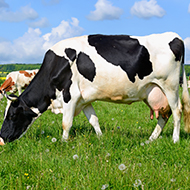
Multiject IMM Intramammary Suspension will arrive January 2021.
The Veterinary Medicines Directorate (VMD) has updated its advice on the availability of lactating cow intramammary antibiotics.
Earlier this year, the VMD were informed by Marketing Authorisation Holders (MAHs) of supply problems with certain lactating cow intramammary antibiotics.
On Tuesday (18 August) the list of anticipated resolution dates was updated. Combiclav Intramammary Suspension for Lactating Cows is now expected November 2020 while Multiject IMM Intramammary Suspension will arrive January 2021.
The full list is as follows:
| Product | Anticipated Resolution Date |
|---|---|
| Synulox Lactating Cow Intramammary Suspension (42058/4143) | October-December 2020 |
| Tetra-Delta Intramammary Suspension (42058/4152) | October-December 2020 |
| Ubro Yellow Milking Cow Intramammary Suspension (08327/4305) | Product discontinued – no return date |
| Multiject IMM Intramammary Suspension (02000/4062) | January 2021 |
| Albiotic 330mg/100mg Intramammary Solution (30282/4035) | End of July 2020 |
| Mastiplan LC, 300mg/20mg Intramammary Suspension (01708/4534) | End of June 2020 |
| Cobactan MC Intramammary Suspension for Lactating Cows (42810/4000 | End of June 2020 |
| Combiclav Intramammary Suspension for Lactating Cows (02000/4424) | November 2020 |
The following lactating cow intramammary products have been reported as available for veterinary surgeons to purchase:
Ubropen 600 mg Intramammary Suspension for Lactating Cows (42810/4000)
Ubrolexin Intramammary Suspension for Lactating Dairy Cows (08327/4306)
Procapen Injector 3g intramammary suspension for cattle (24745/4023)
Orbenin L.A. 200mg Intramammary Suspension (42058/4090)
Pathocef 250mg Intramammary Suspension (42058/4094)*
Cefimam LC, 75 mg Intramammary
Pathocef 250mg Intramammary Suspension (42058/4094)*
Cefimam LC, 75 mg Intramammary Ointment for Lactating Cows (02000/4387)
Further details on the supply situation for individual UK-authorised product can be obtained through the MAH or a wholesale dealer.



 The Veterinary Medicines Directorate (VMD) is inviting applications from veterinary students to attend a one-week extramural studies (EMS) placement in July 2026.
The Veterinary Medicines Directorate (VMD) is inviting applications from veterinary students to attend a one-week extramural studies (EMS) placement in July 2026.